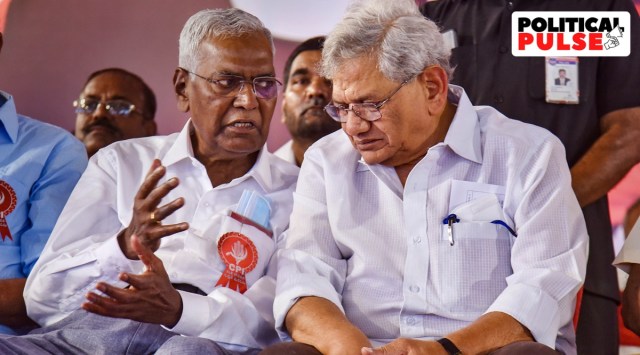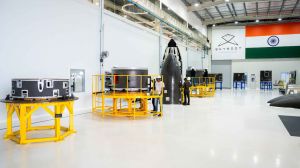‘Pan-India parties must work with regional parties… In Karnataka, Congress should have had some poll understanding…’: D Raja
As his party loses national status, CPI general secretary on the way forward: "We have to take up long-term as well as short-term ideological, political issues, address questions of class, caste and patriarchy, focus on issues of livelihood... build a broad platform"
 Hyderabad: CPI (M) General Secreatry Sitharam Yechuri and CPI General Secretary D. Raja during CPI-CPI(M) State level meeting, in Hyderabad, Sunday, April 9, 2023. (PTI Photo)
Hyderabad: CPI (M) General Secreatry Sitharam Yechuri and CPI General Secretary D. Raja during CPI-CPI(M) State level meeting, in Hyderabad, Sunday, April 9, 2023. (PTI Photo) On April 10, the Election Commission (EC) withdrew the “national party” status of the Communist Party of India (CPI), along with that of a few others, culminating a process that began after the 2019 general elections, whose results were disastrous for all Communist parties.
The status accords a party several advantages, from the permission to use a common symbol across states, to free airtime during polls on public broadcasters and a party office in New Delhi, etc. But for that, a party has to be recognised as a state party in four states and have a minimum of two members in the respective Legislative Assemblies, along with a minimum 6% of the votes in the state. The CPI’s diminished status reflects an ongoing, pan-India trend over the past several decades. CPI general secretary D Raja speaks to The Indian Express about his party’s future in light of the recent development, and other issues. Excerpts:
The CPI has lost its national party status. The Left (including CPI) has been suffering an electoral slide for some years…
Raja: It is a fact that the strength of the Left has gone down in Parliament. Now the CPI(M) and CPI together have only five MPs in the Lok Sabha. We still have a presence in a few Assemblies. There is a gap between our ideological and political spread and influence, and our electoral performance, for which there are several reasons. Many new issues have come up in the country. When the Congress was ruling, the CPI was one of the main Opposition parties in Parliament. And it played a great role in shaping and strengthening parliamentary democracy and democratic polity of the country. Even today, the Parliament building has statues of four Communist leaders — Indrajit Gupta, Bhupesh Gupta, S A Dange and A K Gopalan. They show the contribution of Communists in shaping parliamentary democracy in our country. Over the years, our electoral system started suffering from many ills, with many new factors coming into play… religion, caste, money… But obviously, the Left and CPI can’t be like others. Our party has been demanding comprehensive electoral reforms — a proportional representation system and a level playing field for all political parties. The parliamentary committee headed by Indrajit Gupta had proposed State funding of elections. Instead of accepting that, the BJP government introduced the electoral bond system, and is taking full advantage of that.
But it also seems the Left has not changed with the times, that you are unable to communicate with the people using your old political idioms and language.
Raja: I don’t think so… Even today, if you consider intellectuals, theoreticians or political analysts… they are Left-minded people, irrespective of whether they are directly associated with Party X or Party Y. That’s why I mentioned ideological influence. Even today, if you see an intellectual, he will be [from the] Left.
What about the masses?
Raja: We’re reaching out to the masses. In Indian society, we need to address several questions. One is class inequality and exploitation. The other is social inequality and discrimination, ie, caste. Then there is patriarchy… gender inequality and disempowerment… So class, caste and patriarchy have to be confronted. The Left does it, but others try to instigate conflicts of caste and religion. They create turmoil. That’s really a problem for the Left. Nevertheless, the Left is trying to unite the people. For instance, the Left is working with other progressive movements — the Ambedkarite movement. ‘Jai Bhim, Lal Salaam’ has emerged as a country-wide slogan… Similarly, ‘Lal-Neel’. We’re making all efforts to work with the Ambedkarite movement. In Tamil Nadu, we work with the Periyarists and Dravidian parties for the cause of social justice, self-respect and social reforms.
What I’m trying to say is that the Left is now aligning with these political and ideological currents. That’s the only way forward. Today, if the Indian revolution at all has to move forward, there should be unity among Communists, Ambedkarites and Periyarists… followers of all social reformers, starting from Sree Narayana Guru, Ayyankali… We need to work together. That is what we’re trying to do.
Isn’t it ironic that the Left believes there is huge economic distress in the country, rise in unemployment and prices, etc. And yet, you aren’t able to get your message across to the masses? What’s lacking?
Raja: Neo-liberal economic policies have led to unprecedented inequality, not only within the country, but among nations as well. They have led to the emergence of new trends in social life — like consumerism, individualism… There is huge unemployment in the country… One should not just look at a few sections in the cities or urban centres… One should not think that everything is OK and people are moving on happily… One has to go to the slums and villages to witness the levels of poverty and suffering… That’s why there are spontaneous movements time and again… For instance, the Kisan movement, which wasn’t organised or led by any one party, but emerged as a movement.
The Punjab Assembly polls that followed the farmers’ protest saw the rise of the Aam Aadmi Party. The Left did not benefit.
Raja: I’m coming to that. First, let’s talk about the crisis. In Sri Lanka, we saw such a popular protest… Same in Pakistan, Nepal… India is no exception. As you asked: what is the political leadership doing? By political leadership, I mean the Left-wing leadership. Because in India, we’ve seen the communal-fascist forces becoming aggressive. They divide people. They even tried to divide the Kisan Andolan along communal lines… India is in a complex situation, with the right-wing fascist forces becoming very aggressive. Yes, the AAP emerged as a force, but one has to wait and see the AAP’s ideological and social perspectives. There are many questions they need to answer.
What should the Left do to capitalise on these situations?
Raja: The Left has to cope with the emerging situation. The Left will have to go to the people, connect with them… As Lenin said, the Left will have to learn from the people and lead them.
How can it be done?
Raja: We’ll have to strengthen our student’s movement, youth movement, women’s movement, trade unions, kisan unions… These class, and mass, organisations need to be strengthened. The CPI has to take up long-term as well as short-term ideological and political issues. The Left will have to address questions of class, caste and patriarchy, and bring to focus fundamental issues of livelihood of the people such as education, healthcare, employment, housing, food, land… All these have to be made part of the agenda. The Left will have to build a broad platform on these issues, so that we can bring other political and social forces into the struggle.
Nitish Kumar Wednesday met the Congress leadership.. In Parliament, it’s easier for parties to unite, but on the ground, it’s different. Is it even practical? In Bengal, can the Left have an alliance with the TMC? In UP, can the SP, BSP and Congress enter into an alliance? The same question applies to Telangana.
Raja: Regarding Opposition unity, there are two levels. At the national level, there must be a common understanding that secular, democratic parties must come together to defeat the BJP to change the government in defence of things like the Constitution, democracy, secularism. The second level is the state, because in India, the political situation varies from state to state. We must admit and recognise the complexity and the balance of political forces in different states. One should understand that regional parties have a say in shaping national politics. As such, they also have a role that can’t be ignored. So, pan-India parties should know how to work with regional parties, while regional parties should know how to work at the national level with secular, democratic parties that are also competitors in their respective states.
In Tamil Nadu, the DMK-led coalition has the DMK, Congress, Left parties, VCK and MDMK. In Bihar, the Mahagathbandhan headed by the RJD has the Congress and three Left parties. Whether a similar development will take place in other states is a big question. There, political parties big and small must have mutual trust and accommodation. For instance, a party can be the single largest party, but it doesn’t mean it can sideline or ignore smaller secular democratic forces. There must be mutual accommodation. If such an understanding emerges, there is a real possibility of a united national opposition.
So the Congress, a national party, should be willing to be a junior partner in some of the states?
Raja: That’s exactly my point. In Karnataka, the Congress should have entered into some electoral understanding… seat-sharing with the Left and other secular democratic parties. But that didn’t happen.
Do you think all Opposition parties should formally launch a United Front at the national level, where such issues can be discussed?
Raja: Once the 2024 general elections are over, we’ll be able to see a concrete picture.
And before that?
Raja: Before elections, there should be common understanding, on the basis of which state-level alignments can take place. Conceding the role of every party, regional or otherwise, there should be mutual trust and accommodation.
Will the CPI legally challenge the EC decision, or will you write to the EC, urging a reconsideration?
Raja: So far, we’ve not taken any decision on this. But we’re hoping that our symbol will remain the same everywhere. We’ll think it over.


- 01
- 02
- 03
- 04
- 05





























